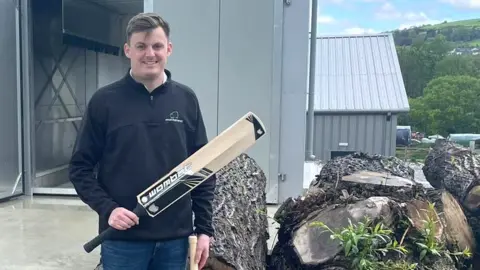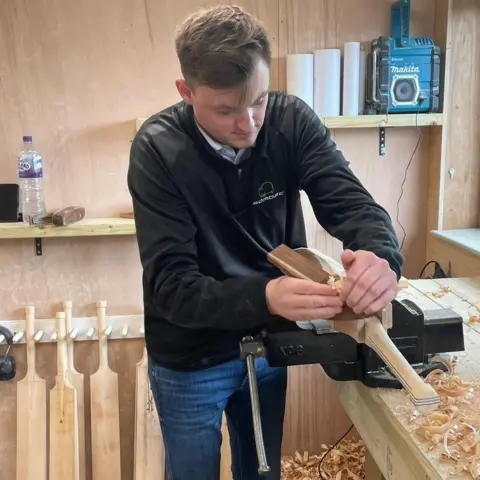Cricket: Devon craftsman making bats the traditional way
 BBC
BBCA cricket fan and craftsman is keeping up the centuries-old tradition of handmaking bats from English willow.
Harry Solomon, of South Brent, Devon, said the traditional process was "a dying art" in England.
Mr Solomon believes his is the only business producing handmade bats in the south-west and one of "a handful" in the country.
He said it was great to see his bats being used out on the pitch, scoring runs.
Mr Solomon, 29, is from a family of cricket lovers and and first picked up a bat as a toddler.
He started playing competitively aged seven and now regularly swings one of his bats for Ivybridge Cricket Club.
With time on his hands between A-Levels and university, he decided to put his woodwork skills to the test and made his first bat in his parents' garage.
"It's good fun to see something from the trunk of a tree all the way through to a cleft, and then through to a bat and to see that bat being used on a Saturday afternoon," he said.

He said most cricket bat production had shifted abroad to reduce costs.
"I'm trying to keep the tradition alive," he said.
The timber is left in a kiln for four weeks to reduce the moisture content before the wood is pressed and shaped.
'Weight, balance, profile'
Mr Solomon said every bat had its own characteristics of grain structure, knots, blemishes and the grade of wood.
"You can make the shape that you want it to be - the weight, the balance, the profile - all the different aspects that go into bat-making," he said.
"Doing it by hand, we can control the whole of that process."
Through his Wombat Cricket business, Mr Solomon has also started growing his own willow trees which will take about 15 years to mature.
He said the greatest pleasure came from seeing his bats in use.
"You always want to see your bats scoring runs," he said.

Follow BBC News South West on Twitter, Facebook and Instagram. Send your story ideas to [email protected].
